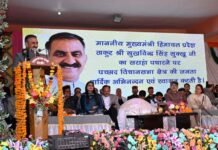In a significant meeting chaired by Chief Minister Thakur Sukhvinder Singh Sukhu, the Himachal Pradesh State Cabinet unveiled a series of crucial decisions aimed at improving public welfare, employment generation, disaster preparedness, healthcare infrastructure, and agricultural support across the state. These comprehensive measures reflect the government’s commitment to grassroots development, administrative efficiency, and responsive governance.
One of the most impactful decisions taken in the meeting was the regularization of 1,386 Jal Rakshaks (Water Guards) into Pump Attendants in the Jal Shakti Vibhag. These individuals have completed over 12 years of continuous service as of December 31, 2024, and their induction is not only a recognition of their dedicated work but also a substantial step towards strengthening rural water infrastructure. This decision is expected to enhance the delivery of water-related services across the state and will also provide job security to those who have long served in uncertain terms.
Furthering its support to the state’s horticulture sector, the Cabinet also approved the procurement of apples under the Market Intervention Scheme (MIS) for the year 2025 at the rate of Rs. 12 per kilogram. In addition to apples, B and C grade kinnow, malta, and oranges will be procured at the same rate, while galgal will be procured at Rs. 10 per kilogram. For seedling, grafted, and kacha achari mango varieties, the procurement price has also been fixed at Rs. 12 per kilogram. This intervention is likely to offer timely economic relief to fruit growers, particularly during the market glut period, and ensure fair prices for their produce.
In a landmark initiative for disaster management and public safety, the Cabinet accepted the recommendations of the Cabinet Sub-Committee on Disaster Management and Rehabilitation. Headed by Revenue Minister Jagat Singh Negi, the Sub-Committee was formed to identify measures to improve the state’s disaster resilience. Among its major proposals was the recommendation to conduct structural safety audits of all buildings across Himachal Pradesh, followed by retrofitting where required. It also emphasized the mandatory incorporation of earthquake-resistant and hazard-resilient features in all future constructions. To bolster disaster response, the committee proposed integrating Home Guards, Civil Defence, Fire Services, and the SDRF with the State Disaster Management Authority’s operational framework, ensuring a rapid and unified response in emergencies.
The development of the Durgesh-Aranya Zoological Park in Dehra, Kangra district, also received a boost with the Cabinet approving the translocation of 325 trees under Phase I. In the same district, a new Regional Transport Office (RTO) will be established at Dehra, which will be supported by adequate staffing and infrastructure to serve the regional population more effectively.
Taking a people-first approach to healthcare, the Cabinet greenlit the upgradation and equipping of 18 district hospital day care centres and selected Adarsh Swasthya Sansthans for chemotherapy services. This move is poised to benefit cancer patients by providing accessible, affordable, and localized treatment options, reducing the need to travel to distant medical colleges or facilities outside the state. Complementing this, a 50-bed Critical Care Block and District Integrated Public Health Lab will be set up at Civil Hospital Tegu-behar in Kullu district.
The supply of essential medical equipment was also approved for several healthcare institutions, including Civil Hospital Manali, Regional Hospital Solan, Civil Hospital Paonta, Civil Hospital Dehra, Regional Hospital Reckong Peo, and Dr. Radhakrishanan Government Medical College in Hamirpur. District Integrated Public Health Labs will also receive new medical equipment at multiple hospitals, ensuring better diagnostic capacity and timely interventions.
In a move to bolster the state’s dairy economy, the Cabinet sanctioned the establishment of new milk processing plants in Nahan, Nalagarh, Mohal, and Rohru, along with a milk chilling centre at Jalari in Hamirpur and a bulk milk cooler at Jhalera in Una district. Additionally, the introduction of an Enterprise Resource Planning (ERP) software in the Himachal Pradesh Milk Federation will help digitize operations and make crucial information easily accessible to dairy farmers through mobile platforms. This digitization is expected to increase efficiency, transparency, and accountability in milk procurement and distribution.
Strengthening the state’s technical education landscape, the Cabinet also approved the rationalization of teaching and non-teaching staff in Government Polytechnic Colleges. This step will improve staff deployment based on actual academic requirements and student enrollment patterns, thereby promoting optimal resource utilization.
These extensive Cabinet decisions come at a crucial time for Himachal Pradesh, which continues to recover from environmental challenges while aiming to build a resilient and inclusive development model. From employment regularization and agricultural support to disaster readiness and medical care expansion, the announcements underscore the state government’s forward-looking vision and its unwavering commitment to holistic development and citizen welfare.





